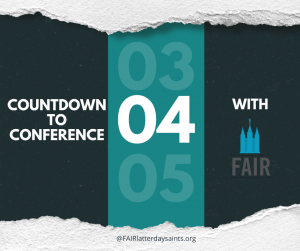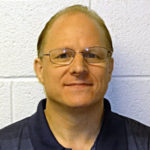
General Conference is coming up in 4 days! It will be held April 1-2, and will have morning and afternoon sessions on Saturday and Sunday, along with an evening session for everyone on Saturday. More information is available here.
In preparation, we are doing a daily countdown with posts from different people explaining how they feel about General Conference, how they prepare, tips for getting the most out of it, how to deal with associated social media posts, etc.
General Conference: Answers and Questions
by Edwin E. Gantt
As a Professor of Psychology at Brigham Young University, every day I am blessed with the privilege of interacting with and instructing some of the best young minds the Church of Jesus Christ of Latter-day Saints has to offer. It truly is a pleasure – and a very heavy responsibility – to be entrusted with teaching the youth of Zion. Although my students come from a stunning variety of backgrounds, ethnicities, family situations, races, and cultures – don’t ever let anyone tell you the BYU student body is some homogenous blob – among those things they do happen to share in common is a desire for answers. Indeed, most of my students have chosen psychology as their major area of study is because they assume that the discipline of psychology holds answers to their questions. After spending most of my adult life in the discipline I am not nearly as confident as they are that this is the case, but that is a story for another time. Regardless, it is one of the great joys of my life to be able to time each day with such vibrant, eager, and faithful young people who are so motivated to seek out answers and strive for greater, deeper understanding of themselves, the world, and the Gospel of Jesus Christ.
There was a time when I, too, was as driven as they are to find answers to my questions, to learn the reasons for why the world is the way it is, why people think and act the way they do, and what it is we need to do to help people live better, more fulfilling lives by making the world a better place. Not a bad thing to desire, all in all, especially when compared with some other, less noble motivations that are easy enough to cultivate. However, over time I have come to find myself much more interested in good questions than in quick answers; at least of the sort of quick answers that my colleagues in psychology seems so eager to provide. While most of us tend to be attracted to answers, especially when we are struggling in some way to make sense of things, I have come to believe that nothing quite engages the whole soul as does a really good question. Answers are the sorts of things that once you have them in hand, the next thing you do is use them to solve problems, fix the things that have gone wrong so you can then move on to the next issue. Answers are, no doubt, on the whole, really good things and definitely worth our time and energy to seek out and find. Still, as I have said, I find myself more and more attracted to good questions, the sorts of questions that come from looking at problems in a new way, from a different angle, deeper and more persistently, the kind of questions that force us to examine not only the problem at hand but ourselves as well. Such questions not only require patience, meditation, and self-reflection, but also push us to take stock of who we are, what our desires and purposes are and ought to be, and why we have been doing what we’ve been doing. A really good question is one that draws us out of ourselves, pulling us from the safe, self-imposed confines of our own narrow agendas and which forces us to confront the world in often uncomfortable, soul-stretching, mind-expanding ways.
What does any of this have to do with General Conference, you may be wondering. Simply this. Most of us look forward to General Conference as a time to hear from the Lord’s anointed, from His chosen prophets and apostles, seers and revelators, and other ordained leaders. We tend to come seeking answers to our questions, answers that will solve some doctrinal puzzle for us or which will bring some balm of Gilead to soothe our pain and fear. And such answers freely flow from the podium to our eager, waiting hearts. This is, without doubt, one of the greatest blessings, and one of the most important purposes of, General Conference. What a joy to be instructed so powerfully, so lovingly, and so clearly twice a year by those who speak for the Lord, and whose speaking brings forth the very answers so many of us desire and for which we so earnestly hope. Seeking answers from the Lord through his ordained ministers is noble, worthy, and good.
I would like to suggest, however, that there may be something more we could do to further enrich and enliven the spiritual feast that is General Conference. While we need not lay aside our desire for answers, I want to suggest that General Conference may well be a time for us to listen more closely, attend more carefully and more intentionally to what is taught that we might thereby discern more clearly what questions the Lord would have us ask ourselves. In addition to approaching General Conference as a time to present to the Lord and those who speak in His name our questions and concerns, and then await the answers we seek, perhaps we might approach it as a time to learn from the Lord what concerns we ought to have, what questions He thinks we ought to be asking. I believe that in doing so we open the door for the Lord to more fully speak to us, inviting Him to orient us in the direction He would have us face, allowing Him to draw our attention more intensely to those things He is concerned about for us. It goes without saying that our Father in Heaven and His Son Jesus Christ are very good at providing the needed answers to any and all of our sincere and genuine questions. What is less often appreciated, though, is how very good they are at framing for us the right questions for us to ask. Indeed, as the Pharisees, Sadducees, and others, including His own disciples, learned for themselves time and again during His earthly ministry, the Savior often responded to the questions posed to Him by turning the questions themselves around, often inside-out and upside down, in order to show that regardless of how sincere or insincere the questioner might have been, they were asking the wrong questions (see, for example, Matthew 22:15-22).
I look forward to General Conference every six months because I have many questions, many concerns of both mind and heart, and I seek answers in the inspired words of prophets, seers, and revelators. Over the years, I have been richly blessed by a loving Heavenly Father by the answers I have found in the teachings in General Conference. More and more recently, however, I have found that General Conference is also a time for learning that sometimes I am asking the wrong questions, worried about getting answers to concerns that are far too narrow and limited. This coming General Conference I look forward to again listening carefully to the Spirit of the Lord that I might learn not so much the answers to whatever questions I may have thought up for myself, but rather that I might learn what questions my Father in Heaven would have me ask of Him, and myself.
 Edwin E. Gantt is currently Professor of Psychology at Brigham Young University and a Research Fellow of the Wheatley Institution. He received his doctoral degree in Clinical Psychology from Duquesne University. He is the author of over 80 scholarly articles and book chapters. His primary research interests revolve around the questions of moral agency and the relationship between religion, science, and psychology. He is co-author (with Richard N. Williams) of Hijacking Science: Exploring the Nature and Consequences of Overreach in Psychology, editor of the textbook series Taking Sides: Clashing Views on Psychological Issues, and Co-Editor of the journal Issues in Religion and Psychotherapy (the official journal of the Association of Latter-day Saint Counselors and Psychologists). He teaches courses in the History and Philosophy of Psychology, Personality Theory, Qualitative Research Methods, Psychology of Religion, and (his favorite) LDS Perspectives on Psychology. He and his wife Anita live in Springville and have four wonderful sons, two amazing daughters-in-law, and two beautiful grandsons.
Edwin E. Gantt is currently Professor of Psychology at Brigham Young University and a Research Fellow of the Wheatley Institution. He received his doctoral degree in Clinical Psychology from Duquesne University. He is the author of over 80 scholarly articles and book chapters. His primary research interests revolve around the questions of moral agency and the relationship between religion, science, and psychology. He is co-author (with Richard N. Williams) of Hijacking Science: Exploring the Nature and Consequences of Overreach in Psychology, editor of the textbook series Taking Sides: Clashing Views on Psychological Issues, and Co-Editor of the journal Issues in Religion and Psychotherapy (the official journal of the Association of Latter-day Saint Counselors and Psychologists). He teaches courses in the History and Philosophy of Psychology, Personality Theory, Qualitative Research Methods, Psychology of Religion, and (his favorite) LDS Perspectives on Psychology. He and his wife Anita live in Springville and have four wonderful sons, two amazing daughters-in-law, and two beautiful grandsons.
